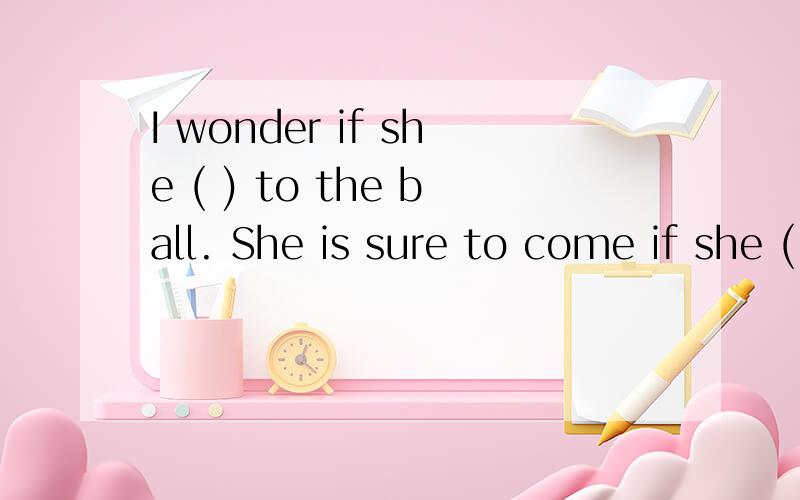I wonder if she ( ) to the ball. She is sure to come if she ( ) time tonight.A:comes;has B:will come;has答案是B,不大明白,求详解,谢谢.
来源:学生作业帮助网 编辑:作业帮 时间:2024/09/03 06:38:16

x��R�n�@��Y���!�]��Қb��1��A(���RAR�����Ӫ�\۔I�����=� U]tQɲ��9��s�~���k��
�y<O�V
�����/Y$A��%1�xU,���R!�+қ��x~^�g�,��cI�#|x��6��H��ȹ��;�5��R �+�5�B��e_"uTJ�[UQ�?H���^_RM�������-��J9V��[����5H�)`��|��ȹ���5C���#!�
V�a�l��f��/}�|G�7�����$���Z�o6丌
�+��ܲ�ِt�`|�JgP�Rc�� SEz��?�C����ex�n& լ�ތ<
2�v�`���?���_�'�N�|������i�f�+�
/E�)# a�9�1���t� z�-����Vg�����@�{lx,�2A��EoLT _
r��+(TYjI���m{��^ y6
���{
_Pd���?f
��]C�����;���G2
I wonder if she ( ) to the ball. She is sure to come if she ( ) time tonight.A:comes;has B:will come;has答案是B,不大明白,求详解,谢谢.
I wonder if she ( ) to the ball. She is sure to come if she ( ) time tonight.
A:comes;has B:will come;has
答案是B,不大明白,求详解,谢谢.
I wonder if she ( ) to the ball. She is sure to come if she ( ) time tonight.A:comes;has B:will come;has答案是B,不大明白,求详解,谢谢.
前面的if是“是否”之意,引导一个宾语从句,come这个动作还没发生,所以用will come
后面的if为“如果”之意,此时要用一般现在是来表示一般将来时,所以用has
B
wonder if + 宾语从句, 从句中可以用将来时
if+ 状语从句,(从句用现在时态代替将来时)
第一个空当然是说的将来了,第二个空是一般现在时。不懂吗?
wonder, 未去,so use future tense
下句:simple present tense
条件壮语从句 第一个是将来要发生的事,第二个是事实
i wonder if.
i wonder if you
I Wonder If 歌词
I wonder if it is.
25.I wonder if she ____ tonight.If she ____,I’ll let you know.A.will come,comes B.comes,will come C.comes,comes
i wonder if iever cross your
I wonder if there is fresh air.
用I wonder if造句,并翻译
I Wonder If He Knows 歌词
I often wonder if it can.
wonder和if是固定搭配吗I will alway wonder how high she might have lifted that car (if )she have been well and strong.这个句子为什么要用if?
为什么要用if 用语法知识回答I will alway wonder how high she might have lifted that car (if )she have been well and strong
it is unlike tom to drink so much ;i wonder if she iis all right 怎样翻译
I wonder if she will turn up at the concert. She will She is only too ___to watch the famous danceA anxiousB proundC willingD cautions
wonder if
I wonder if your girl friend will go to the ball. If she ______, so ______ mine.选项如下!A. does; will B. will; does 为什么!- -
i wonder if i'm going to make it to
I wonder if you will feel the same way I